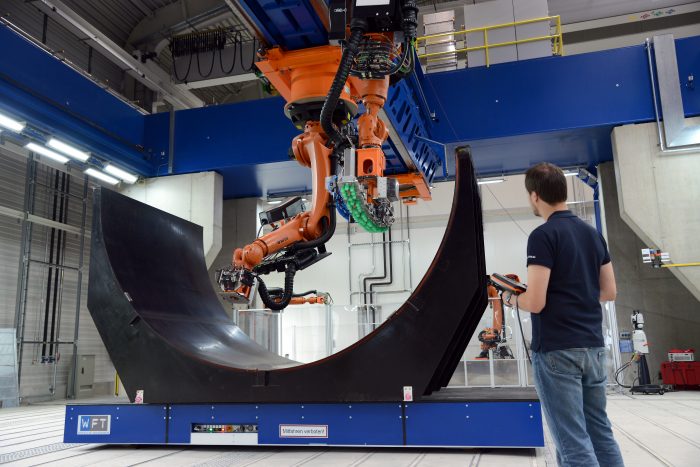Human-Robot Interaction in
Collaborative Manufacturing Environments
(HRI-CME)
IROS 2017 — Vancouver, Canada — September 24, 2017

Important Dates
- Full/short paper submission deadline (Extended): August 11, 2017 @ 11:59pm PT (UTC-7) ✓
- Acceptance notification: September 1, 2017 ✓
- Camera-ready deadline: September 8, 2017 ✓
- Workshop: September 24, 2017
Objectives
The objective of this workshop is to discuss the design, development, and deployment of hardware/software systems for the recognition (from humans) and generation (by the robot) of social behaviors that enable robots to be more effective co-workers with their human counterparts in real-world collaborative manufacturing environments. A strong emphasis will be put on systems that support bidirectional communication between humans and robots for closed-loop operations in human-robot collaborative scenarios. This workshop will bring together academic researchers and industry partners to frame problems and solutions in real-world contexts.
Robotic technologies have become well-established in the manufacturing industry for reducing worker ergonomic stress and workload by performing operations quickly, repeatedly, and accurately. With the introduction of compliant robotic agents (e.g., Rethink Robotics’ Baxter and Sawyer, Kuka’s iiwa, Franka’s Emika, etc.), there is a growing opportunity for collaborative partnerships between humans and industrial robots jointly completing various manufacturing tasks, such as assembly, inspection, box-packing, and part-delivery, among others. As robots continue to be integrated into the workplace as versatile aids for industry automation, it is important to develop effective human-robot communication mechanisms that facilitate seamless cooperation and intuitive communication between humans and robots.
Such collaboration increases manufacturing productivity by effectively combining the capabilities of each partner: the intelligence, experience, and responsiveness of human co-workers, and the accuracy, repeatability, and speed of robotic assistants. A key to facilitate direct and physical human-robot collaboration is developing clear, natural, and bidirectional communication methods to exchange shared understanding and goals between both human and robot collaborators.
In human-human collaborations, workers use a variety of social signals—such as speech, pose, gestures, and touch—to bilaterally transmit commands and task-relevant information. Endowing robots with similar capacities requires new contributions in human-robot interaction (HRI), including gestures, visual attention, proxemics, feedback cues, and turn-taking, among others.
Transferring these signals and collaboration techniques from the lab to industrial application poses novel HRI challenges. While these technologies can contribute to improved ergonomics, increased productivity and worker safety, industrial application is still very difficult as machine safety standards have to be satisfied.
Topics of Interest
- Multimodal human-robot interaction for collaboration
- Verbal, nonverbal, and co-verbal human-robot interaction for collaboration
- Bidirectional gestural communication (e.g., emblematic, iconic, deictic, etc.)
- Human-robot proxemics
- Explicit, implicit, and back-channel feedback cues
- Manufacturing use cases
- Safety standards for collaborative human-robot interaction
- … and more!
Schedule
| 09:00 – 09:15 Introductions and Opening Remarks: Prof. Elizabeth Croft (UBC) |
| 09:15 – 10:00 Invited Speaker: Prof. Clément Gosselin (Laval University) |
| 10:00 – 10:30 Coffee Break |
10:30 – 11:45 Full Talks (12-minute talk + 3-minute Q&A)
|
| 11:45 – 12:15 Invited Speaker: Przemyslaw (Pem) Lasota (MIT) |
| 12:15 – 12:30 Industry Perspectives: Florian Krebs and Manfred Schönheits (German Aerospace Center) |
| 12:30 – 14:00 Lunch |
| 14:00 – 14:45 Invited Speaker: Prof. Bradley Hayes (CU Boulder) |
14:45 – 15:00 Lightning Talks (2-minute talk)
|
| 15:00 – 16:00 Poster Session |
| 16:00 – 16:30 Coffee Break |
| 16:30 – 17:15 Breakout Session (30-minute breakout + 15-minute discussion) |
| 17:15 – 17:30 Closing Remarks: Sara Sheikholeslami (UBC) |
| 19:00 – 21:00 IROS Welcome Reception |
Planned Activities
- Presentations: Full length and “lightning” oral presentations of accepted full and short papers. Presenters of lightning research talks will be invited to participate in a poster session.
- Invited Speakers Invited talks will give different perspectives on the intersection of human-robot interaction and industrial automation. Moderated discussions will allow participants to engage in collaborative public discussion on controversial topics and issues of interest to the workshop audience.
- Breakout Sessions: Participants will gather into small groups to discuss topics related to technical, societal, legal, and ethical considerations for collaborative HRI in manufacturing settings, and present the results of their discussion to the workshop audience.
- Networking: A large part of this effort is to bring together a community of researchers, strengthen old connections, and build new ones. Ample time will be provided for networking and informal discussions.
Invited Speakers
Prof. Clément Gosselin received the Ph.D. degree from McGill University in 1988. He has been at Laval University (Quebec City, Canada) since 1989. He is currently holding a Canada Research Chair in Robotics and Mechatronics at Laval since 2001. He was a visiting researcher at INRIA in France in 1988, at the RWTH in Aachen, Germany in 1995, at the University of Victoria, Canada in 1996 and at the IRCCyN in Nantes, France in 1999. His research interests are kinematics, dynamics and control of robotic mechanical systems with a particular emphasis on the mechanics of grasping, the kinematics and dynamics of parallel manipulators and the development of human-friendly robots. His work has been the subject of numerous publications and he has trained more than 100 graduate students. Dr. Gosselin is a fellow of the ASME, of the IEEE and of the Royal Society of Canada.
Przemyslaw (Pem) Lasota is a PhD candidate in the Department of Aeronautics and Astronautics at the Massachusetts Institute of Technology and a NASA Space Technology Research Fellow. He is a member of the Interactive Robotics Group in the Computer Science and Artificial Intelligence Lab, and is advised by Prof. Julie Shah. Pem’s research focuses on enabling safe and efficient close-proximity human-robot interaction through developing robust and generalizable approaches of predicting human motion. He is interested in applying his work in various contexts, ranging from manufacturing to space robotics. Pem received his bachelor’s degree in Mechanical Engineering from Rutgers University and his master’s degree in Aeronautics and Astronautics from MIT.
Prof. Bradley Hayes is an Assistant Professor at the University of Colorado Boulder School of Engineering in the Department of Computer Science. He received his PhD from Yale University and completed a postdoc at MIT focusing on enabling close-proximity human-robot collaboration, creating algorithms to enable robotic teammates to learn from and work productively with humans by anticipating their needs. Brad’s research interests center around developing the algorithms and explainable Artificial Intelligence techniques necessary for creating supportive, interactive, communicative, and intuitive robotic systems that are capable of establishing shared expectations with people and safely performing complex collaborative tasks in human-populated environments.
Paper Categories
- Full Papers (5-6 pages): highlight state-of-the-art research framing industrial automation as a collaborative HRI problem
- Short Papers (1-2 pages): outline new or controversial views, or describe ongoing work in collaborative HRI in manufacturing settings
Submission Guidelines
All papers must be written in English and submitted electronically as a US letter-sized (8.5” x 11”) PDF format of length no more or less than the page limit of the corresponding submission type.
- Submission Site: https://easychair.org/conferences/?conf=hricme2017
- Preparation Guidelines: http://ras.papercept.net/conferences/support/support.php
- Latex Template: http://ras.papercept.net/conferences/support/tex.php
- MS Word Template: http://ras.papercept.net/conferences/support/word.php
Presentation and Publication
All accepted full and short papers will be presented orally and published online on the workshop website. Authors will be notified as to whether they have been assigned a “full-length” or “lightning” presentation slot. Authors assigned to lightning talks will be invited to participate in a poster session.
Contact
For more information, contact the workshop organizers at iros.workshop.hri.2017(at)gmail.com
Organizers
Sara Sheikholeslami
Researcher
Collaborative Advanced Robotics and Intelligent Systems (CARIS) Laboratory
Department of Mechanical Engineering
University of British Columbia (UBC)
s.sheikholeslami(at)ubc.ca
Ross Mead, PhD
Founder and CEO
Semio
ross(at)semio.ai
Prof. Elizabeth A. Croft
Director
Collaborative Advanced Robotics and Intelligent Systems (CARIS) Laboratory
Department of Mechanical Engineering
University of British Columbia (UBC)
elizabeth.croft(at)ubc.ca
Florian Krebs
Team Leader, Flexible Automation Systems
Institute for Structures and Design / Center for Lightweight Production Technology (ZLP)
German Aerospace Center (DLR)
florian.krebs(at)dlr.de
Manfred Schönheits
Scientist
Institute for Structures and Design / Center for Lightweight Production Technology (ZLP)
German Aerospace Center (DLR)
manfred.schoenheits(at)dlr.de




